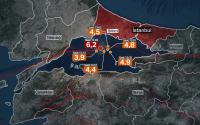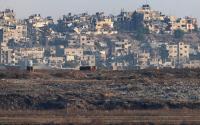9 July 2004
The court observes that the lack of consent to the court's contentious jurisdiction by interested states has no bearing on the court's jurisdiction to give an advisory opinion.
The court acknowledges that Israel and Palestine have expressed radically divergent views on the legal consequences of Israel's construction of the wall, on which the court has been asked to pronounce. However, as the court has itself noted, "Differences of views... on legal issues have existed in practically every advisory proceeding".
The court does not consider that the subject-matter of the General Assembly's request can be regarded as only a bilateral matter between Israel and Palestine. Given the powers and responsibilities of the United Nations in questions relating to international peace and security, it is the court's view that the construction of the wall must be deemed to be directly of concern to the United Nations.
The "wall" in question is a complex construction, so that that term cannot be understood in a limited physical sense. However, the other terms used, either by Israel ("fence") or by the [UN] Secretary General [Kofi Annan] ("barrier"), are no more accurate if understood in the physical sense. In this opinion, the court has therefore chosen to use the terminology employed by the General Assembly.
Approximately 975 sq km (or 16.6% of the West Bank) would, according to the report of the Secretary General, lie between the Green Line and the wall. This area is stated to be home to 237,000 Palestinians. If the full wall were completed as planned, another 160,000 Palestinians would live in almost completely encircled communities, described as enclaves in the report. As a result of the planned route, nearly 320,000 Israeli settlers (of whom 178,000 in East Jerusalem) would be living in the area between the Green Line and the wall.
Israeli settlements in the occupied Palestinian territory (including East Jerusalem) have been established in breach of international law.
The construction of the wall and its associated regime create a "fait accompli" on the ground that could well become permanent, in which case, and notwithstanding the formal characterisation of the wall by Israel, it would be tantamount to de facto annexation.
The court is of the opinion that the construction of the wall and its associated regime impede the liberty of movement of the inhabitants of the occupied Palestinian territory (with the exception of Israeli citizens and those assimilated thereto).
The construction of the wall would effectively deprive a significant number of Palestinians of the "freedom to choose [their] residence".
Construction, coupled with the establishment of the Israeli settlements... is tending to alter the demographic composition of the occupied Palestinian territory.
Article 51 of the [UN] Charter thus recognises the existence of an inherent right of self-defence in the case of armed attack by one state against another state. However, Israel does not claim that the attacks against it are imputable to a foreign state. Consequently, the court concludes that Article 51 of the Charter has no relevance in this case.
The fact remains that Israel has to face numerous indiscriminate and deadly acts of violence against its civilian population. It has the right, and indeed the duty, to respond in order to protect the life of its citizens. The measures taken are bound nonetheless to remain in conformity with applicable international law.
The court, from the material available to it, is not convinced that the specific course Israel has chosen for the wall was necessary to attain its security objectives. The construction of such a wall accordingly constitutes breaches by Israel of various of its obligations under the applicable international humanitarian law and human rights instruments.
The court has thus concluded that the construction of the wall constitutes action not in conformity with various international legal obligations incumbent upon Israel.
It finds that: (a) the construction of the wall being built by Israel, the occupying power, in the occupied Palestinian territory, including in and around East Jerusalem, and its associated regime, are contrary to international law (by 14-1; US Judge Thomas Buergenthal against)
Israel obligations:
(b) Israel is under an obligation to terminate its breaches of international law; it is under an obligation to cease forthwith the works of construction of the wall being built in the occupied Palestinian territory, including in and around East Jerusalem, to dismantle forthwith the structure therein situated, and to repeal or render ineffective forthwith all legislative and regulatory acts relating thereto (by 14-1; US Judge Thomas Buergenthal against) (c) Israel is under an obligation to make reparation for all damage caused by the construction of the wall in the occupied Palestinian territory, including in and around East Jerusalem (by 14-1; US Judge Thomas Buergenthal against)Other states' obligations:
(d) All states are under an obligation not to recognise the illegal situation resulting from the construction of the wall and not to render aid or assistance in maintaining the situation created by such construction; all states parties to the Fourth Geneva Convention relative to the Protection of Civilian Persons in Time of War of 12 August 1949 have in addition the obligation, while respecting the United Nations Charter and international law, to ensure compliance by Israel with international humanitarian law as embodied in that Convention (by 13-2; US Judge Thomas Buergenthal and Netherlands Judge Pieter H. Kooijmans against)UN obligations:
(e) The United Nations, and especially the General Assembly and the Security Council, should consider what further action is required to bring to an end the illegal situation resulting from the construction of the wall and the associated regime, taking due account of the present Advisory opinion (by 14-1; US Judge Thomas Buergenthal against).





